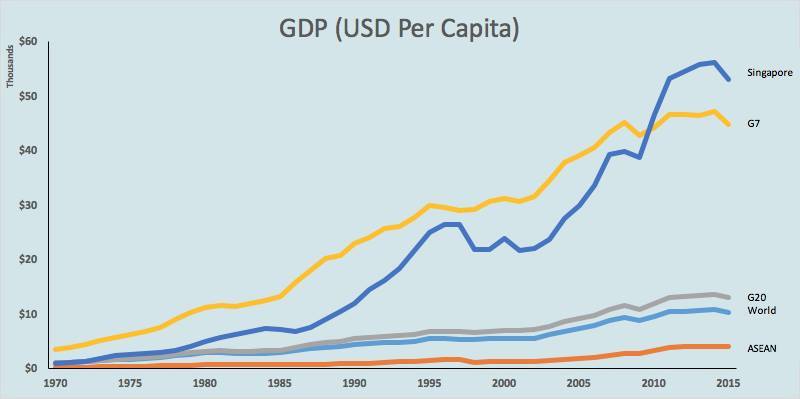Biotechnology in Singapore
Introduction to Biotechnology in Singapore
Primary Contributor and Team Leader: Duncan Spilsbury
Since gaining independence in 1965, Singapore has grown to become one of the world’s most prosperous countries. Due to its location within Southeast Asia, and its proximity to the South China Sea, Singapore’s coastal ports are considered one of the busiest in the world. Found to be largely open, the Singaporean economy has been corruption-free, and produces a per capita gross domestic product (GDP) that is higher than most developed countries, sitting at $85,300 in 2015. Singapore was, and continues to be, an advocate of free trade. This claim can be supported through the various free trade agreements and partnerships that they have engaged in. Singapore was one of the five founding members of the Association of Southeast Asian Nations (ASEAN), a member of the Trans-Pacific Partnership, as well as the Regional Comprehensive Economic Partnership negotiations with surrounding nations.
Singapore derives the majority of its economic growth from its exports, which include refined petroleum, integrated circuits, computers, and various biotech-products. The focus of this year’s Singapore team will be in the biotech-industry, specifying in the biomedical and pharmacology field.

Within the span of ten years, Singapore’s biomedical manufacturing industry had quadrupled, from $6 billion to $23.3 billion, comprising 5% of the country’s total gross domestic product (GDP). This can be attributed to the large investments in infrastructure done by the government as well as foreign companies. Singapore currently has seven research institutes as well as five other research consortia in various fields, all relating to the biotech-industry. The Singaporean government has made steps to ensure the continual growth of its biotech-industry, offering various research grants, worth millions of dollars, to scientists who are looking to undertake translational and clinical research within the country. From 2011 to 2015, the government had also dedicated $16.1 billion in continued support of research, with $3.7 billion of the funds going directly to enhance the existing research infrastructure. While Singapore does attract some of the leading scientists in the world to its institutes, they have also garnered the interest of some of the largest pharmaceutical companies. Companies such as Sanofi-Aventis, GlaxoSmithKline, MSD, Novartis, and Sanofi are currently operating in Singapore, where they have set up their regional clinical trial centres. These companies are not only providing the opportunity for further economic development in Singapore, they are also contributing financially to scientists who are involved with the research.
While countries in Asia continue to develop economically, their healthcare expenditure will also increase; and with Asia’s drug industry having an estimated worth of $168 billion US dollars, and growing at a rate of over 12 percent per year, the demand for continual research and development will ensue. If large pharmaceutical companies continue to invest in Singapore’s already advanced biotech industry, it will become an even greater component of its growing GDP.

